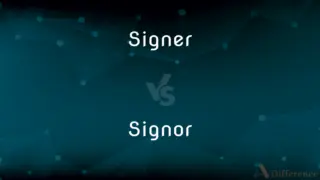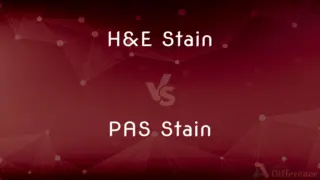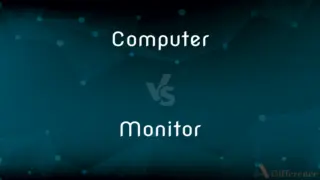Etiquette vs. Netiquette — What's the Difference?
Edited by Tayyaba Rehman — By Urooj Arif — Updated on March 13, 2024
Etiquette refers to the formal rules of correct behavior in society or among members of a particular profession or group, while netiquette encompasses the code of conduct required on the Internet.

Difference Between Etiquette and Netiquette
Table of Contents
ADVERTISEMENT
Key Differences
Etiquette encompasses the customary codes of polite behavior in society or among members of a particular profession, focusing on face-to-face interactions. These rules can vary widely between cultures, generations, and situations, and are often implicit, making them challenging to learn for outsiders. On the other hand, netiquette refers specifically to the rules of etiquette that apply to online communication. Unlike traditional etiquette, netiquette has a strong emphasis on the written word and is influenced by the global nature of the internet, making it more uniform across different cultures.
While etiquette might dictate the appropriate attire for a wedding, the correct way to address a person of a certain status, or how to conduct oneself at a formal dinner, netiquette covers the proper use of email, forums, social media, and other online communication platforms. Whereas etiquette might involve complex rituals or forms of address, netiquette tends to be simpler, focusing on respect, clarity, and the avoidance of online conflict.
Etiquette often involves nuances such as body language, tone of voice, and timing, which play a crucial role in conveying respect and understanding. In contrast, netiquette lacks these physical cues, leading to a greater reliance on clear language and the use of emoticons or other digital expressions to convey tone.
In the realm of etiquette, certain behaviors are considered universally inappropriate, such as speaking with one's mouth full or interrupting others. Similarly, netiquette condemns behaviors like spamming, trolling, or the use of all caps, which is seen as shouting online.
Etiquette and netiquette both aim to facilitate smooth, respectful interactions, but they adapt to their respective environments. Etiquette evolves with society and culture, reflecting the values and norms of the time, while netiquette evolves with technology, adapting to new forms of communication and the expanding digital landscape.
ADVERTISEMENT
Comparison Chart
Scope
Social & professional settings
Online communication
Focus
Behavior, attire, speech
Email, forums, social media
Cultural Variation
High, varies widely
Lower, more uniform
Expression of Tone
Body language, tone of voice
Emoticons, explicit language
Common Prohibitions
Interrupting, improper attire
Spamming, trolling
Adaptability
Evolves with culture
Evolves with technology
Physical Presence Required
Yes
No
Main Communication Medium
Face-to-face, letters
Digital platforms
Compare with Definitions
Etiquette
The set of conventional rules for polite behavior in society or among members of a specific group.
Proper etiquette dictates sending thank-you notes after receiving gifts.
Netiquette
The set of rules for behaving properly online.
Following netiquette, one should avoid typing in all caps, as it signifies shouting.
Etiquette
The practice of showing respect through gestures and verbal expressions.
Maintaining eye contact during a conversation is an important part of social etiquette.
Netiquette
Guidelines for composing and responding to emails in a respectful and considerate manner.
Netiquette includes acknowledging the receipt of an email within a reasonable time frame.
Etiquette
The guidelines for dressing appropriately for different occasions.
Etiquette recommends formal attire for a black-tie event.
Netiquette
The practice of respecting others' privacy and not sharing personal information without consent.
Good netiquette involves asking permission before tagging people in photos on social media.
Etiquette
The customs associated with dining, such as the use of specific utensils for certain dishes.
Understanding dining etiquette can make formal dinners less intimidating.
Netiquette
The etiquette of engaging in online discussions without resorting to personal attacks.
Netiquette encourages constructive criticism and discourages ad hominem attacks.
Etiquette
The rules for engaging in polite conversation, avoiding topics that may cause discomfort.
Etiquette advises against discussing religion or politics at social gatherings.
Netiquette
Rules against spamming or flooding online forums with repetitive messages.
According to netiquette, one should contribute valuable insights instead of spamming threads.
Etiquette
Etiquette ( and ; French: [e.ti.kɛt]) is the set of conventional rules of personal behaviour in polite society, usually in the form of an ethical code that delineates the expected and accepted social behaviours that accord with the conventions and norms observed by a society, a social class, or a social group. In modern English usage, the French word étiquette (ticket) dates from the year 1750.
Netiquette
Etiquette practiced or advocated in electronic communication over a computer network.
Etiquette
The customary code of polite behaviour in society or among members of a particular profession or group
The rules of etiquette are changing
Court etiquette was now familiar to Joan
Etiquette books
Netiquette
(Internet) Conduct while online that is appropriate and courteous to other Internet users, and may be expected or enforced by others.
Top-posting and spamming are considered poor netiquette on a newsgroup.
Etiquette
The practices and forms prescribed by social convention or by authority.
Etiquette
The forms required by a good upbringing, or prescribed by authority, to be observed in social or official life; observance of the proprieties of rank and occasion; conventional decorum; ceremonial code of polite society.
Etiquette
The customary behavior of members of a profession, business, law, or sports team towards each other.
Etiquette
A label used to indicate that a letter is to be sent by airmail.
Etiquette
The forms required by good breeding, or prescribed by authority, to be observed in social or official life; observance of the proprieties of rank and occasion; conventional decorum; ceremonial code of polite society.
The pompous etiquette to the court of Louis the Fourteenth.
Etiquette
Rules governing socially acceptable behavior
Common Curiosities
How does cultural variation affect etiquette?
Cultural variation greatly affects etiquette, as different cultures have their own rules and norms regarding polite behavior.
Are there any universal rules of netiquette?
Universal rules of netiquette include respecting others' privacy, avoiding personal attacks, and adhering to the specific guidelines of different online platforms.
Is netiquette simpler than traditional etiquette?
In many ways, netiquette is simpler, focusing on written communication and basic principles of respect and clarity, but it also requires understanding of online communication nuances.
Can bad netiquette have real-world consequences?
Yes, bad netiquette, such as online harassment or privacy breaches, can have serious real-world consequences, including legal action.
How can one learn proper netiquette?
Proper netiquette can be learned by reading online guidelines, observing the practices of respected online communities, and applying common sense principles of respect and courtesy.
Can the principles of etiquette apply to online settings?
Yes, many principles of etiquette, such as respect and courtesy, are foundational to netiquette as well.
Can breaking netiquette rules lead to being banned from online platforms?
Yes, violating netiquette rules, especially those set by specific online platforms, can lead to temporary or permanent bans.
Does etiquette change over time?
Yes, etiquette evolves over time, reflecting changes in society, culture, and technology.
Is it important to follow etiquette in casual settings?
While the rules may be relaxed in casual settings, following basic etiquette can still enhance social interactions and show respect for others.
What is the main difference between etiquette and netiquette?
The main difference is their scope of application; etiquette applies to traditional social and professional settings, while netiquette applies to online communication.
Why is netiquette important in online education?
Netiquette is important in online education to ensure respectful, productive communication between students and instructors, fostering a positive learning environment.
How important is etiquette in professional settings?
In professional settings, proper etiquette is crucial as it reflects on one's personal brand and can influence career advancement.
How does one address someone properly according to etiquette?
Proper address according to etiquette depends on the situation and relationship, ranging from the use of titles and last names in formal settings to first names in more casual contexts.
What is the role of etiquette in international diplomacy?
Etiquette plays a key role in international diplomacy, facilitating respectful and effective communication between representatives of different cultures.
Share Your Discovery

Previous Comparison
From vs. Since
Next Comparison
Primer vs. FoundationAuthor Spotlight
Written by
Urooj ArifUrooj is a skilled content writer at Ask Difference, known for her exceptional ability to simplify complex topics into engaging and informative content. With a passion for research and a flair for clear, concise writing, she consistently delivers articles that resonate with our diverse audience.
Edited by
Tayyaba RehmanTayyaba Rehman is a distinguished writer, currently serving as a primary contributor to askdifference.com. As a researcher in semantics and etymology, Tayyaba's passion for the complexity of languages and their distinctions has found a perfect home on the platform. Tayyaba delves into the intricacies of language, distinguishing between commonly confused words and phrases, thereby providing clarity for readers worldwide.















































